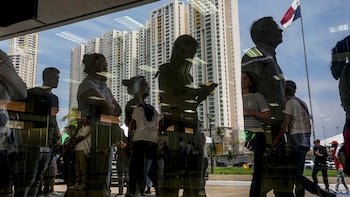
(ATR) Beefed up video surveillance, increased numbers of lab technicians, and thousands of tests are just part of the protections to avoid a repeat of the Sochi anti-doping lab manipulation says the IOC Medical Director.
Dr. Richard Budgett spoke with journalists after presenting to the IOC Executive Board today. He said that anti-doping bodies’ "awareness" of the manipulation plan from Sochi has led to measures to prevent it in Seoul, where PyeongChang tests will be carried out.
"We have no expectation that it is going to happen in the Seoul laboratory," Budgett said.
The Seoul lab will be monitored by 24/7 video surveillance, which will be kept after the Games are complete for review. The Rio de Janeiro laboratory in 2016 was fitted with cameras as well in response to the Sochi revelations. The video surveillance will be the first used in a Winter Olympics.
More than two dozen experts from around the world will be part of the Seoul laboratory team, adding an extra layer of security. Four laboratory experts will be joining the team, along with 20 international doping control experts and two additional World Anti-Doping Agency laboratory experts.
To prepare for the PyeongChang 2018 doping controls, the Global Association of International Sports Federation’s Doping-Free Sport Unit has worked on both the pre-Games and games testing programs.
GAISF, along with five National Anti-Doping Organizations, the Association of Winter Olympic International Federations, the World Anti-Doping Agency and the IOC developed the pre-Games testing plan. Budgett says that over 16,000 tests were conducted as part of the pre-Games testing plan starting in April of last year.
The plan focused on athletes in the top-20 of each winter sport for individual events, and countries that were likely to send teams to the Games. Budgett noted that tests did occur for athletes that were targeted by intelligence in the testing system that fell outside of these rankings. Also, all Russian athletes were required to be tested regularly, after findings from the McLaren report. Those tests were used to determine which athletes were invited to compete as Olympic Athletes from Russia in PyeongChang.
During the Games, organizers expect to carry out about 2,500 anti-doping tests. Of those tests 1,800 are expected to be urine tests and 700 blood tests. Of the tests 1,400 are expected to be conducted out of competition, with the remaining 1,000 or so done in-competition.
"We don’t know who’s cheating where and when," Budgett said of the testing. "You’ve got to think, part of this is deterrence, it has got to be unpredictable, and its got to be spread across all the disciplines so there is a deterrent effect right across the board."
Budgett says he hasn’t visited the Seoul laboratory since December, but GAISF and the DFSU have been overseeing the doping control program.
The PyeongChang test distribution plan has five steps. First a doping control station manager places samples in a box, which are then placed into a numbered kit bag. Those bags are handed to a security guard and driver while the chain of custody is logged. The samples are anonymously received at the Seoul laboratory, where the samples are tested for integrity. While at the lab every part of the process is monitored by video surveillance.
If an adverse analytical finding is found, it must be confirmed by the DFSU before the case is moved before the Court of Arbitration for Sport, where the athlete has a chance to present his or her case. CAS then will announce the decision if it rules it is an anti-doping rule violation.
Budgett presented the test distribution plan to the IOC Executive Board today during the morning session of its meeting. In the presentation Budgett also stressed the need for such plans to be independently developed in the future.
He said that the board was "very receptive" to the plans, and it required a small change to existing IOC anti-doping rules, which were passed.
After the Olympics, the Independent Testing Authority, created by the IOC, is expected to assume the legal control of the pre-Games testing program. The ITA will then take over for the DSFU’s clients, around 40 international federations, and handle the Tokyo 2020 pre-Games testing.
Written by Aaron Bauerin PyeongChang
25 Years at #1: Your best source of news about the Olympics is AroundTheRings.com, for subscribers only.
Últimas Noticias
Utah’s Olympic venues an integral part of the equation as Salt Lake City seeks a Winter Games encore
Utah Olympic Legacy Foundation chief of sport development Luke Bodensteiner says there is a “real urgency to make this happen in 2030”. He discusses the mission of the non-profit organization, the legacy from the 2002 Winter Games and future ambitions.

IOC president tells Olympic Movement “we will again have safe and secure Olympic Games” in Beijing
Thomas Bach, in an open letter on Friday, also thanked stakeholders for their “unprecedented” efforts to make Tokyo 2020 a success despite the pandemic.

Boxing’s place in the Olympics remains in peril as IOC still unhappy with the state of AIBA’s reform efforts
The IOC says issues concerning governance, finance, and refereeing and judging must be sorted out to its satisfaction. AIBA says it’s confident that will happen and the federation will be reinstated.

IOC president details Olympic community efforts to get Afghans out of danger after Taliban return to power
Thomas Bach says the Afghanistan NOC remains under IOC recognition, noting that the current leadership was democratically elected in 2019. But he says the IOC will be monitoring what happens in the future. The story had been revealed on August 31 in an article by Miguel Hernandez in Around the Rings

North Korea suspended by IOC for failing to participate in Tokyo though its athletes could still take part in Beijing 2022
Playbooks for Beijing 2022 will ”most likely” be released in October, according to IOC President Thomas Bach.




